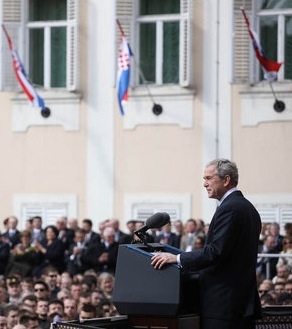 As many readers know, when a President makes a foreign trip, a battalion of security, logistics, protocol and media personnel precede and accompany Air Force One. Having witnessed and participated in many such visits in my former career as a State Department diplomat, I can attest to the fact that preparations can be overwhelming, especially for a small country not accustomed to such visits. I happened to be in Croatia on private business in the days and weeks preceding President Bush's overnight visit to Zagreb last Friday. As might be expected, much of the media coverage in Croatia in the days leading up to the visit concerned the way the visit would impact the city. Which streets would be closed? Where would the President stay? Would there be any contact with the public?
As many readers know, when a President makes a foreign trip, a battalion of security, logistics, protocol and media personnel precede and accompany Air Force One. Having witnessed and participated in many such visits in my former career as a State Department diplomat, I can attest to the fact that preparations can be overwhelming, especially for a small country not accustomed to such visits. I happened to be in Croatia on private business in the days and weeks preceding President Bush's overnight visit to Zagreb last Friday. As might be expected, much of the media coverage in Croatia in the days leading up to the visit concerned the way the visit would impact the city. Which streets would be closed? Where would the President stay? Would there be any contact with the public?
There is, from my vantage point, an important public diplomacy dimension to such visits that rarely surfaces in the coverage of the U.S. media traveling with the President. This is because the hundreds of journalists in the "traveling press" are enveloped in a logistical cocoon that prevents any contact with the public at large. Moreover, U.S. editors are only interested in what the President says, and the "news" in what a President says often has nothing to do with country being visited. Local reaction is only newsworthy back home only if something bad happens or (maybe) if the crowds are extraordinarily large. The possibility of the latter is remote, unfortunately, given security concerns. It is particularly sad that a U.S. President — any president — has therefore very little opportunity for unrehearsed contact with everyday foreign citizens. Without U.S. media interest, and the acquiescence of the security apparatus, there is scant likelihood that this will change in the future.
In addition, with the election campaign underway in the United States, and Bush's lame duck status, his visit got even less coverage in the U.S. media than it should have. The future of NATO, US-Russian relations, the enlargement of NATO to include Croatia and Albania (and the intra-alliance dissent over Ukraine and Georgia) are of fundamental importance to the United States, but barely got mentioned in the American news media — even by the 24-hour networks. (CNN is more consumed by its continual regurgitation of what a Southside Chicago preacher said years ago.) Yet these issues have been discussed in detail for weeks by foreign media and publics in the countries that Bush just visited.
A visit by POTUS (President of the United States — in White House-speak) evokes apprehension as well as excitement on the part of local governments, and can have a real impact on how the local public regards the United States of America. On the eve of the Bush visit, a local newspaper printed a public opinion survey that showed 48.6 per cent supported the visit, 18 per cent opposed it and 30 per cent were indifferent. Of greater concern, only 12.4 per cent of those surveyed had a positive view of America's role in the world and 58 per cent said they felt that Croatia had a "subservient" relationship to the U.S.
Did the President's visit change the public's view? For now, we can only speculate. One thing is sure: A Presidential visit for better or worse makes a lasting impression on the local public, and their opinion will be important for the future of U.S. foreign policy — no matter who gets to lead it beginning next January.